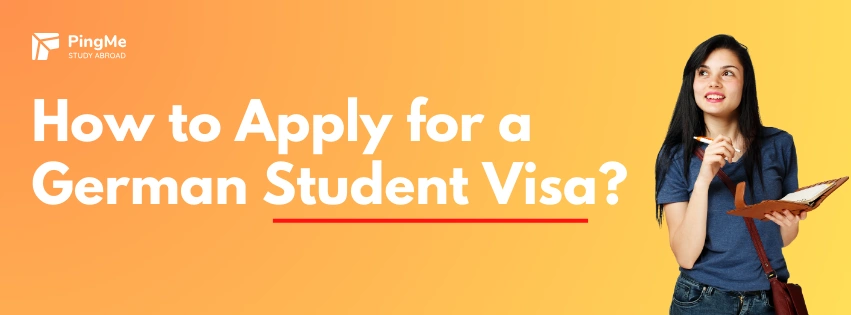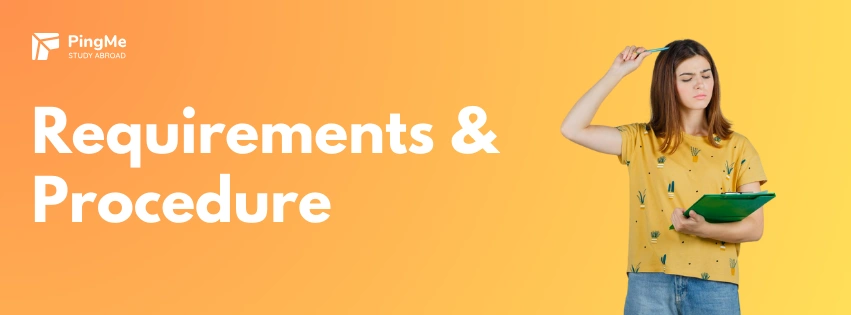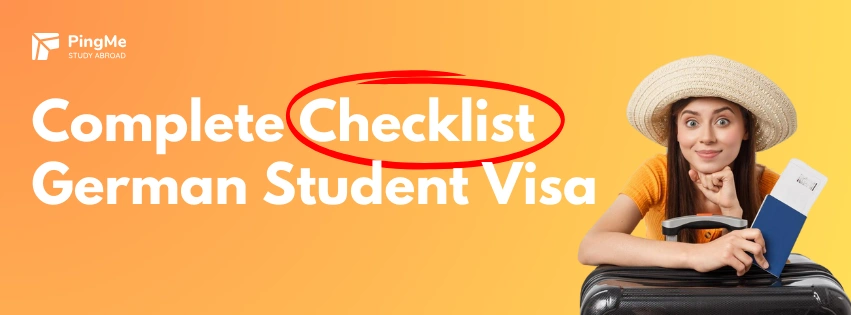December 26, 2024
Germany Student Visa Requirements for Indian Students: A Complete Checklist
Table of Contents
Germany, the land of innovation, precision, and rich cultural heritage, has firmly established itself as a hub for higher education. With a world-class education system, affordable tuition fees, and an emphasis on research, it attracts thousands of international students every year. Indian students, in particular, are drawn to Germany’s highly ranked universities offering programs in diverse fields such as engineering, medicine, business, and arts. Add to this the opportunity to experience Europe’s vibrant lifestyle, and Germany becomes a top contender for studying abroad.
This article is your ultimate guide to understanding Germany’s student visa requirements, application process, benefits, and a detailed checklist to streamline your preparations.
How to Apply for a German Student Visa
Applying for a German student visa involves a step-by-step process. Here’s a detailed breakdown:

- Secure Admission to a German University
- Begin by obtaining an admission letter from a recognized German university. Ensure the course aligns with your academic and career goals.
- Gather Required Documents
- Start collecting all necessary documents, ensuring they meet the specified guidelines.
- Complete the Application Form
- Fill out the Application Form for National Visa (available on the official German Mission website). Print, sign, and keep it ready for submission.
- Sign the Declaration Form
- Print and sign the Declaration on True and Complete Information, a mandatory requirement for the visa application.
- Schedule a Visa Interview
- Book an appointment at the nearest German Embassy or Consulate. Slots can fill up quickly, so plan ahead.
- Prepare a Demand Draft for the Visa Fee
- Confirm the exchange rate for the visa fee (€75) and prepare a demand draft in INR.
- Attend the Visa Interview
- Submit your application and supporting documents in person at the consulate. Be prepared to answer questions about your study plans and finances.
- Wait for Processing
- Visa processing can take up to 25 working days or longer, so ensure you apply well in advance.
Requirements and Procedure
The German student visa application has specific prerequisites. Here’s what you need to know:

- Proof of Admission: Your official admission letter is the cornerstone of your application.
- Financial Proof: Show evidence of sufficient funds to cover your stay, typically through a blocked account with €11,208 or other acceptable financial guarantees.
- Language Proficiency: Depending on your course, you’ll need to demonstrate proficiency in German or English through test scores (e.g., IELTS, TOEFL, TestDaF).
- Travel Insurance: Ensure you have valid travel insurance covering at least the initial three months of your stay.
- Biometric Photos and Valid Passport: Keep these documents ready and ensure your passport is valid for the duration of your stay.
Benefits of Studying in Germany
Studying in Germany offers a host of advantages that go beyond academics:
- Affordable or Free Tuition: Public universities in Germany charge minimal or no tuition fees, making education accessible.
- High-Quality Education: German universities consistently rank among the top in the world, offering cutting-edge research facilities.
- Diverse Job Opportunities: Germany’s robust economy provides ample part-time work opportunities for students and a strong job market post-graduation.
- Post-Study Work Visa: After completing your studies, you can apply for an 18-month work visa to explore job opportunities in Germany.
- Rich Cultural Experience: Studying in Germany allows you to immerse yourself in European culture, history, and a multilingual environment.
Complete Checklist for German Student Visa Requirements
Here’s a detailed checklist to ensure your application is complete. Remember to prepare two sets of documents:

- Valid Passport: Ensure it has sufficient validity for the duration of your stay.
- A4 Size Copy of Passport’s Information Page: Keep this ready for submission.
- Completed Visa Application Form: Download, fill, and sign the form.
- Signed Declaration Form: Print and sign the declaration of complete and true information.
- Cover Letter: Write a concise and compelling letter explaining your study goals and reasons for choosing Germany. A German translation may be required.
- University Admission Letter: Attach the official admission letter from your German institution.
- Academic Records: Include degree certificates, mark sheets, and transcripts.
- Proof of Language Proficiency: Submit test scores like IELTS, TOEFL, or German language tests (PhD and Erasmus Mundus students may be exempt).
- Financial Proof: Provide evidence of financial support, such as a blocked account or scholarship confirmation.
- Biometric Photos: Ensure these comply with specifications and are not older than six months.
- Demand Draft for Visa Fee: Prepare a demand draft worth €75 in INR.
A German student visa opens the doors to world-class education, diverse cultural experiences, and unmatched career opportunities. By meticulously following the application process and adhering to the checklist, you can simplify your visa journey. Start preparing your documents well in advance, stay organized, and double-check every detail before submission.
Germany promises an enriching academic experience, and this visa is your first step toward unlocking countless possibilities. Embrace the journey, and good luck!
Contact Us
For any inquiries regarding your student visa or studying in Germany, feel free to reach out to us!
Phone Support: +91 8590 236 994
Email: info@pingmestudyabroad.com
Website:www.pingmestudyabroad.com
We look forward to assisting you on your study abroad journey!
FAQs
What is the processing time for a German student visa?
The processing time for a German student visa typically takes up to 25 working days. However, it may vary depending on the individual case and the time of year.
How much financial proof is required for a German student visa?
You must show proof of sufficient funds, generally by depositing €11,208 into a blocked account. Other acceptable options include a scholarship letter or financial guarantee.
Can I apply for a student visa without knowing German?
Yes, if your course is taught in English, you can apply with English proficiency test scores such as IELTS or TOEFL. For German-taught courses, proficiency in the German language is mandatory.
Do I need travel insurance for a German student visa?
Yes, travel insurance covering at least the first three months of your stay is required. It must meet the minimum coverage specifications.
Is there an age limit for applying for a German student visa?
No, there is no specific age limit for applying for a German student visa. However, you should justify your educational goals in your cover letter.
How do I book an appointment for a student visa interview?
You can book an appointment through the official website of the German Embassy or Consulate in your region. Slots are limited, so plan ahead to secure a suitable date.
Can I work part-time while studying in Germany?
Yes, international students can work up to 120 full days or 240 half days per year without requiring additional permits. Ensure your job complies with visa conditions.
What happens if my visa application is rejected?
If your visa application is rejected, you will receive a rejection letter outlining the reasons. You can address the issues and reapply or appeal the decision.
Is it necessary to translate my documents into German?
Some documents, like your cover letter or academic certificates, may require translation into German or English. Check the embassy’s specific requirements.
How long can I stay in Germany after completing my studies?
After completing your studies, you can apply for an 18-month post-study work visa to search for job opportunities related to your field.
How many hours is part-time work in Germany?
International students can work up to 120 full days or 240 half days per year, which is typically around 20 hours per week during the semester and up to 40 hours per week during breaks.
How much is paid per hour for part-time jobs in Germany?
The pay for part-time jobs varies depending on the type of work and location, but the minimum wage is around €9.60 per hour. However, some jobs may pay more depending on the industry.
What are the in-demand programs in Germany?
In-demand programs in Germany include Engineering (Mechanical, Automotive, Civil, Electrical), Computer Science, Artificial Intelligence, Business and Management, Medicine, Renewable Energy, and Data Science.
What are the top universities in Germany?
Some of the top universities in Germany include:
Ludwig Maximilian University of Munich (LMU)
Technical University of Munich (TUM)
Heidelberg University
Humboldt University of Berlin
University of Mannheim
University of Freiburg
Is it hard to get into public universities in Germany?
Admission to public universities in Germany is competitive, especially for popular programs like medicine, engineering, and business. However, if you meet the academic requirements and have a strong application, gaining admission is possible.
How much CGPA is required to get into a German university?
The required CGPA varies by university and program. Generally, a CGPA of 2.5 or above on a 4.0 scale is acceptable for many programs. However, highly competitive programs may require a higher CGPA.
Other Blogs
3
Feb

How to Qualify for Germany’s Opportunity Card: Eligibility Criteria Explained
Germany’s Opportunity Card offers skilled professionals an easier way to live & work in Germany. Learn about the eligibility criteria, points system, and more.
28
Jan

Why Choose German Public Universities for Your Master’s Program?
Discover why German public universities are ideal for a Master's: world-class education, tuition-free programs, vibrant culture, and excellent career prospects!
2
Jan

Germany’s Opportunity Card: A Game Changer for Skilled Professionals
Germany's Opportunity Card offers skilled professionals a simplified path to live and work in Europe's strongest economy, no job offer needed.


